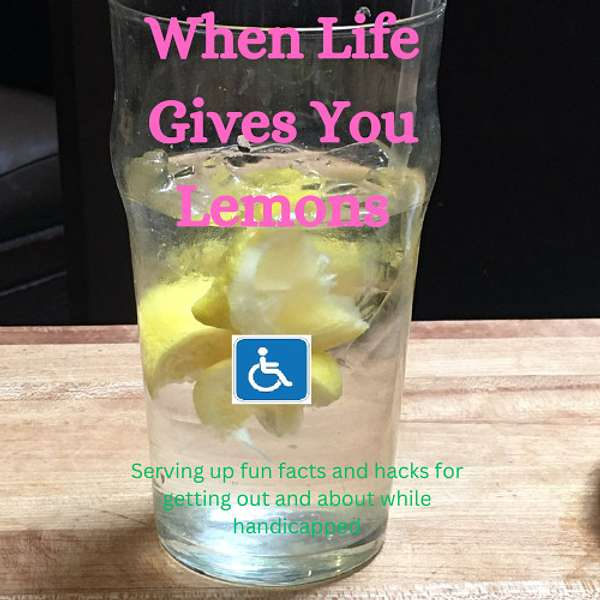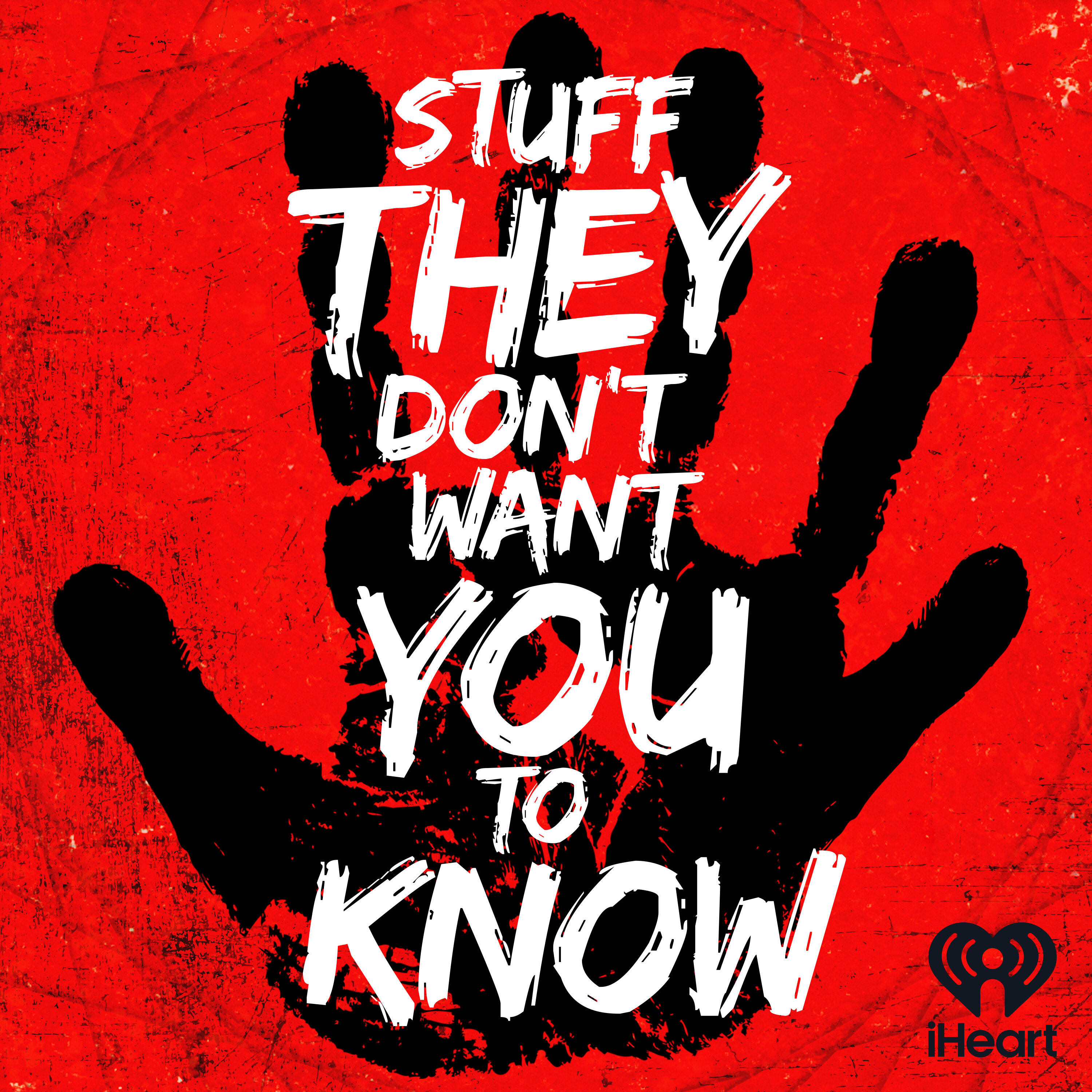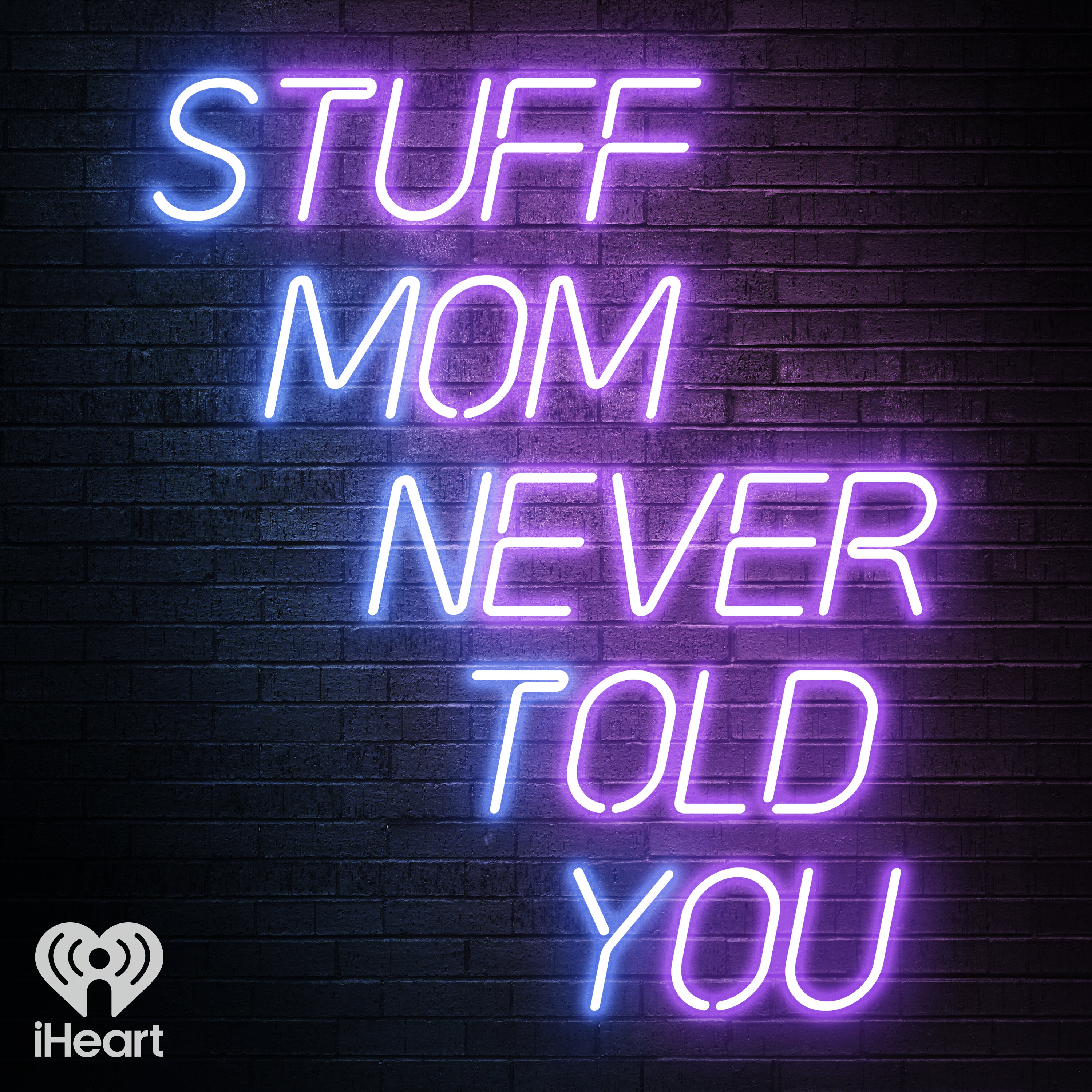
When Life Gives You Lemons
We do a bit of Research into handicapped travel issues and provide some solutions. Mobility, Hearing, Sight, Mental issues included. so far our episodes have included some information on Ataxia, Cerebral Palsy, Deafness, Dancing Sickness, Gulf War Syndrome, Long Covid and Wheelchairs. We are both Disability Advocates and realize there are too many diseases and conditions to cover and try to discuss the most common problems disabled people face and spread some awareness of disabled issues non-disabled people are unaware of.
CORRECTION
On a Previous episode I described how to enter our End Of Season contest. Step 1 click on the support our show link. Step 1 we require a one time payment (This has changed during our season) of $3. Step 3 (get you back to a one time payment) click on the $3 Subscription button. The following business day cancel the subscription (if you do it same day your bank may start thinking FRAUD. Step 4 Your done. Thanks for entering and "may the odds be forever in your favor",
When Life Gives You Lemons
Parenting on the Spectrum: A Mother's Journey
The mystery of autism becomes deeply personal in this intimate conversation with Jessica, a mother whose journey with her autistic son ultimately inspired her own career in special education. Jessica takes us through the pivotal moment when her toddler son seemed to change overnight around his second birthday – suddenly struggling with motor skills despite previously reaching developmental milestones early.
What makes this episode particularly valuable is Jessica's honest portrayal of both the challenges and triumphs. She shares her initial denial upon getting the diagnosis, followed by her fierce determination when medical professionals suggested limitations her son might face. "We'll see," she responded, launching into years of dedicated advocacy and support-seeking that would transform both their lives.
Through Jessica's experiences, we gain practical insights into what actually works for families navigating autism. Her son's unexpected love of music therapy – especially drums and rock concerts – challenges assumptions about sensory sensitivities. Her praise for dedicated special education teachers illustrates how crucial school support systems can be. Most poignantly, she describes the delicate balance between maintaining essential routines while preparing her son for life's inevitable interruptions.
As her son approaches high school graduation with plans to detail cars alongside his father, Jessica reflects on her transformation from advocate to educator. Now completing her own degree in special education, she'll soon support other families through similar journeys. Her advice resonates with wisdom earned through experience: "Don't be scared to get support. Don't stop. Always ask for help."
Whether you're personally connected to autism or simply seeking to understand neurodiversity better, this conversation offers genuine perspective without clinical detachment. Jessica's story reminds us that behind every autism statistic is a family navigating a unique path with creativity, determination, and above all, unconditional love.
Soundstrike.
Palmi:And I'm Call Me. We consider ourselves disability advocates and intend to spotlight some disability issues and things we find interesting that we frequently encounter when we're out and about. Also, some history on disability that we find interesting. History on disability that we find interesting Hello, hey, welcome to the podcast. We have a person to interview today, as we had told you about in the last episode. This is Jessica. Hi, jess, hey, how are you guys? Pretty good. So we have been neighbors for what? Oh my gosh, we have been neighbors for what?
Jessica:Oh my gosh, At least, at least Ten years.
Palmi:At least a decade. Yeah, yeah so and we, best neighbor ever, we, you know, they've always been very helpful with everything. I wouldn't know what to do without John helping me out sometimes.
Jessica:He's handy to have around, very handy, I think he did our dog door.
Palmi:He was so nice about it. He saw me over here struggling and came over and helped, so that was very helpful and your son has autism.
Palmi:Yes, yeah, so we're exploring autism, this episode, but it's nice to hear it from a person that actually experiences it, because you can see the data on paper and understand the data kind of but you don't know the day-to-day what the struggle is from the caretakers, what you've actually had to struggle through and what works for you and what doesn't work for you, so kind of give our listeners an idea of what your case has experienced.
Kevin:And, plus, if you would also go into the spectrum of autism severely autistic, not so severely there's a lot of influencers who are, like, mildly affected by autism, like mildly affect biotism, and people don't see that as much of a problem because, well, you know, explain, for example, a little bit about what's going on at the surface. It's not just the fact she looks so old. She has to, you know, she has to relearn how to cope with society, if you will and social things.
Jessica:Yeah. So what's kind of crazy about autism or unique Landon, my son and another kid. Their data could look exactly the same. They're not going to do the same things. They're going to struggle with different types of sensory issues. What works for this one is not going to work for that one, more than likely. So I think that that's kind of an interesting piece to see.
Palmi:So let's start out. When Landon how was Landon tested? How does that start out? Um when Landon how was Landon tested? How does that start out?
Jessica:so he was tested. Landon was diagnosed a week before his third birthday. Yeah, um, very normal baby did everything very early. He walked before he crawled. He did everything very early and then it was, I think, around his second birthday. It's like he woke up one day and somebody had flipped a switch. He is suddenly having trouble with his motor skills. He's not repeating, he's playing with toys, not the way that he was playing with them before. He was very behind in his speech and me and John had moved in together and he was like you know, I saw this thing and I think maybe we need to look into it and, like most parents, I was in denial. I was like hey, it's because it's an only child, my baby's perfect.
Jessica:Yeah, there's nothing wrong, it's fine. And then I had him and my mom show me the information and I started looking and I'm reading these hallmark signs and it's like somebody just sat down and wrote my kid like wrote what he does. So we went to it used to be Easter Seals that the Autism Center in Cape got with them and within 20 minutes of being in a room I it like hit me and I was like okay, this is what it's going to be.
Jessica:So, there was a little bit of an acceptance. Oh, yeah, yeah. And then you kind of go through that Well, what caused it? Yeah. What did I do wrong to?
Palmi:Yeah, yeah, but they still don't know, do they no Gen?
Jessica:And they still don't know, do they no Genetics? I think is a huge part of it from stuff that we've read and we've even done some studies with different groups. It's mostly answering questions, and that's what they keep coming back to is it's this person has this and this person has this, and so now we get yeah, and so it's just something in that genetic makeup wow, so that's interesting.
Palmi:Yeah, kevin's got us very. His disease is very similar to that, but his is an external source is almost everybody else has a gene that causes it.
Kevin:It's hereditary but there's also an external there's nobody else in my family that has this, so yeah, that's how autism usually is like nobody in the family has anything.
Palmi:The families I've met with now, is there any in your family or no?
Jessica:no, no, nothing, um, yeah, nothing, even um from landon's biological background. There wasn't't, there was nothing, no history of anything.
Palmi:So yeah, so, so, so at three. Then what, what? What do you do?
Jessica:I am hardheaded. So when they they're never negative, but they come to you and they say, okay, never negative, but they come to you and they say, okay, they were still learning a lot about autism.
Palmi:Landon is how old?
Jessica:he's 17, so this was almost 15 years ago, yeah, so, um, but they they said you know, this is kind of what we see. They're probably, he's probably not going to be able to do this, this or this.
Palmi:I hate that one yes, they, they weren't.
Jessica:They weren't negative about it, but they were just like we're preparing you and they didn't know a lot. Back then, yeah, and they didn't. Yeah, and I was just like, okay, well, we'll see. Right, exactly, yeah. So any teacher that would talk to me, any therapist I reached out to book authors, anybody that would talk to me, tell me what I need to do?
Kevin:Right what I need to do.
Palmi:Right, Because we're in people don't know this, but we're in kind of a rural area and not in a metro. You know we're not in a big city, so this is we're kind of a backward area. We kind of are yeah, so you know no majors in hospitals or you know, I mean, we have a university, but it's not a advanced area at all.
Jessica:So yeah, Well, on the where we went to see, yeah, where we went to get tested, where we got him diagnosed, it was part of it's part of the university, I mean so yeah. And so I was just like okay, because they kept telling me well, you know, we they fill up really fast and we've gotten very lucky, um, with everything. So like within two weeks they called and said hey, we had a cancellation. And I was like I don't care the day or the time, tell me and we'll be there, yeah, so. So then it was just kind of from there, what did I need to do? You know, tell me what I need to do to help him thrive, what I need to do to help him thrive. We did pre preschool, we did in home therapies, we did music. Therapy was a huge help. He loves music, so that was a huge because anything could be incorporated into that social skills, your cognitive, all that.
Palmi:Well, we read in the research. Once they have something that they enjoy, they turn to that to teach them the other things.
Jessica:They kind of use that to get ahead better and I really think that's what helped a lot of his his talking right yeah, just thinking back on my experience in like school if I was interested, I did well.
Kevin:If I really didn't care to learn, say, mathematics, I did just as well at it.
Palmi:Yeah, yeah, it's just a human experience like that yeah. And I know, when my dad had his stroke he could not speak but he could sing, and so I know it's done like on the separate sides of the brain too.
Jessica:Yes, yeah, that was one thing that I always when people are like you know what was something that you really noticed. But Landon to drink out of a regular cup, it took us probably four months Because we, just our brain was not connecting. But and that was at like probably four, about four or five years old, but he could take apart Hot Wheels cars and put them back together Model cars, toys, and put them back together. He would take, he would see pictures of animals or flowers, was a big one and he would get his Hot Wheels card and he would make it to that and it would dang near match color and everything. Wow, and it's just like the brain, yeah, but we're just we can't get that cup to the mouth and take a drink, wow, so yeah, Very neat.
Palmi:So it's not necessarily that that's not there, it's just their brains are wired differently, oh yeah, than the typical atypical.
Kevin:Atypical yeah.
Palmi:Yeah, well, okay, so let's talk about school. You said that there's quite a few resources in this area to help you out. Yes, how about school?
Jessica:So school was a huge. They gave me contact to any and everybody.
Palmi:Now, he went to Jackson.
Jessica:Yep, he went to Jackson. I can't say enough about their special education program.
Palmi:Did he go to the local one here?
Jessica:He actually ended up going to South because we were in town at the time. Oh okay, yeah, but he had the same teacher for pre-preschool, preschool and then she ended up going into kindergarten, I believe, with him Now did he go to a?
Palmi:special ed class, or did he get incorporated into the normal?
Jessica:class. So the way they do classes is so you have your I think they call it functional now or essential skills Okay, yeah, I don't know. And that's your typically have trouble communicating. They need more one-on-one time. And then you have your self-contained. That's going to be basically IEP kiddos that are in smaller settings, so there's usually about 12 to 15 kids in the class.
Palmi:Are we talking? This is how they do this. Um, the, the. Uh. What was the word that you were talking about on the spectrum?
Jessica:Oh yeah.
Palmi:That's how they separate yeah.
Jessica:Yeah, depending on on, depending Depending on needs the academic needs and then the personal needs will kind of depend placement, so self-contained, which is typically where I work, no, is that what you went back to become a teacher. Yeah, I graduate in May actually. Oh, I heard yeah.
Palmi:On Facebook. I'm so proud of you. Yes, it's terrifying. I, yeah, I'm so proud of you.
Jessica:Yes it's terrifying. I'm like I feel like that's all I've done for so long. So now I'm like I don't know what to do when I'm done. Right, yeah, go to school.
Palmi:Right. Will you then be able to go back into the program that you learned through Landon?
Jessica:Yes, so yeah.
Palmi:I mean he's out of school now.
Jessica:Will be out, will be, be, will be. Yeah, but you'll still have all those that knowledge that you learned. Yeah, and I'm actually going to be teaching I believe, a self-contained class.
Palmi:See, that's perfect. So yeah, all that knowledge and that background, with learning from him, yeah, he's.
Jessica:He's taught me more than any book ever will like, and I say that all the time. Like he it's kind of, I mean, meant to be right, yeah and and then I'm part of me like why didn't you do this sooner?
Palmi:You never know, do we? Yeah, well, that's great, yeah, and so what's his plans for the future?
Jessica:So he's in his oh my gosh, his senior year. I can't believe that kid's going to graduate.
Palmi:Yeah, I remember when he you told me that he was autistic. I don't remember when, but you told he was on a. Um, it was a halloween halloween, you said I said what you know? What kind of candy does he like? You're like specifically, he likes gum, dum-dums, yes.
Jessica:So every year from that point I had dum-dums for him, like he got a bag of dum-dums all by himself and he, even when we like, if he doesn't dress up, he's like we gotta go over there.
Palmi:He knows, he knows we gotta go to.
Jessica:Palmy's.
Palmi:He always has the scariest costumes he does he loves.
Jessica:He loves scary movies. His range of interest is just. He's totally my kid.
Palmi:I broke up, no, you're good, you're good, so. So what's his plan?
Jessica:So he's actually going to be. He's learning actually to detail cars and work on cars. He wants to work on cars with dad, oh yeah, so we're in the process of doing that and then I think we're going to have him. He's very, very good at doing housework?
Palmi:Is he detail-oriented, very detail-oriented? Is that his thing?
Jessica:If you tell him, okay, if you explain, I need it to look. If you say the way mom cleans and he's pretty like I gotcha, I know what you mean there. So he's pretty good at cleaning. But you have to tell him like I expect it to be this clean, right? He's a typical teenager oh yeah, oh yeah.
Palmi:He's gonna get away with only what he has to do.
Jessica:Yeah, 100%. Well, that's good, that's really good.
Palmi:He's always been such a polite little boy. Yeah, he's a young man now, but yeah, so that's his plan is to get him back.
Jessica:Yeah, he wants to work on cars. Is John going to start a detail? He's talking with work. We're getting it in the works to where he will actually be working there. He'll actually be working there. He'll learn to do simple things on the cars. Okay, um because that is one thing. Once he knows it, he knows it right. So he's. He wants to work on cars and fix cars with dad.
Jessica:That's what he wants to do, so we're gonna split him between that and then he's gonna do some in-home cleaning stuff for my mom, just to, because he loves grandma.
Palmi:So yeah, and so is it, and I don't know, in the future will he be able to live on his own? Yeah, he's got enough. Where on the spectrum is he?
Jessica:So Landon is, and they have it so huge now. I feel like when Landon was initially diagnosed, it was we were at the lower functioning or higher functioning and Landon was considered higher functioning. He's. I would say he's probably like eight to 10 years mentally behind what he should be. So by his late 20s I would be like, yeah, he can have a, Okay. So by his late twenties I would be like, yeah, he can have place, Okay, Like I would feel good about him doing that. It's always an end goal.
Palmi:And and in the spectrum they, they, uh, they continue to get stronger or grow to that age. Or is there a point?
Jessica:where they just stop. It kind of depends, okay, um, a huge part of why Landon has made it as far as he has, or progressed, is because we have been very diligent with the repetition and keeping up.
Palmi:He said, routine is so.
Jessica:Oh, yes, yes, Routine is huge. But at the same time, once Landon got to a point where we were like, okay, we have to prepare him that there's going to be interruptions in the world. And so you had another daughter yes, had a daughter. Yes, we have to prepare him that there's going to be interruptions in the world. And so you had another daughter. Yes, had a daughter. Yes, that had to have been huge.
Palmi:Yeah, he was the baby for a long long time.
Jessica:Oh yeah, that was. I really expected him to have a hard time with that. He actually it took him a while to understand, but he's he acts like he's so loving to. Oh yeah, I mean, he'll tell you, my job is to protect her.
Palmi:He'll tell you, yeah, like he's very proud of it around on halloween and stuff, he's right. Next oh, yeah, a little protection, you know squad, so so I think he's uh adapted well to that yeah, yeah, he's got the routine down, yeah yeah, but then, like my, my son had a baby.
Jessica:Our oldest, oh that's right had a baby and he was just like. I don't want any part of that. It would be like high.
Palmi:Well, it turned his routine off. They moved in and changed the whole aspect of it.
Jessica:Yeah, he's also just not big about babies, like he's just, it's over there, mom, and I'm like I know she's fine, but now that she can walk and chase him, he likes her. Now he's fine, yeah, but now that she can walk and chase him. He likes her now. He talks to her now.
Kevin:Well, I think that's it's probably typical for a teenage boy. Oh, what a man.
Palmi:Yeah Well, and the attention's going somewhere else other than him.
Kevin:Yeah, you know what I mean.
Palmi:Yeah, but well, that's great.
Jessica:I'm really happy to hear all that he's he's doing really, really well. I'm really proud of him he's he's overcome a lot. I was talking about that the other day. Um, I remember going to the mall when he was like six or seven and something set him off and so he's still. He's not able to go. Oh, that's really offending my eyesight, or you know, that smells really offending me.
Palmi:He still has that the century, since I can never say this right the sensory stuff yes, yeah because kevin has the brightness of the eyes. He's literally his eyes um hurt if this, the sun's too bright or the noise, he has anxiety, and so we bring along the noise canceling canceling headphones. So you probably do the same thing.
Jessica:Yeah. Yeah, he's doing a lot better now, but it took a lot to get us here.
Palmi:Learning from you, right yeah? Or adjusting to him.
Jessica:Yeah, we've got to figure out a different way to let me know that you're uncomfortable, right?
Palmi:But yeah, he was in the mall, and communication-wise is he better at that.
Jessica:He's doing a lot better. He will. Sometimes he'll have trouble if it's not something he usually talks about or says. He'll have trouble grabbing words, but for the most part he does really well. He'll tell you like hey, how was your day? It was great, but it's usually a pretty short.
Palmi:Right.
Jessica:Yeah. The communication part is the hardest part, probably. Yeah, yeah, he does, he does, he does really well. Now, like I said, it does. It takes a while to get there. It takes that well, congratulations you as a parent, I mean this is a huge thing for yeah, I the teachers always say that and I'm always like I'm just his cheerleader, like he's doing it, I'm just the cheerleader.
Palmi:I mean, you have to be there to get to this point. Yeah, you know, yeah that's.
Jessica:Yeah, he, the biggest thing is support. Yeah, like hair taking.
Palmi:Let me, let me tell you, I know, yeah, I mean, even though it's someone that you love, and do without.
Jessica:It's a pain in the ass it can be a lot it could be. I've had those days where I'm like I'm going to take a shower, nobody knock on the door, like just I need five minutes.
Palmi:Yeah, yes yeah, I get you. Yeah, taking it is really really harder than anybody ever can imagine yes I went through that with my dad well, my mom and then my dad, and and I've been caretaking for Kevin for about 30 years. So, yeah, not 30 years, 25. We've been married. This will be our 30th anniversary. This year.
Jessica:Oh, my goodness.
Palmi:Congratulations. We just made reservations to go back to Hawaii, nice. So we went to Hawaii on our 15th anniversary and then we're going back on our 30th. We met in Hawaii. Oh, I did not know that. Yeah, we met in Hawaii. So we're going to go back to the scene of the crime, to the scene of the crime, throw him in the ocean that's what I would call it. Yeah, Well, thank you for sharing your story with us. Yeah, Is there anything else that you would like to?
Jessica:share. I could talk about Landon all day.
Palmi:Like yeah, Did we cover everything as far as the disease? Yeah, yeah, I mean other than just, like you said, those personal. Is there any advice that you could give someone that was just diagnosed?
Jessica:um, don't be scared to get support. And and don't don't stop. Yeah, always ask for help, don't stop, don't be scared to ask questions.
Palmi:Sounds like you have a really large um support system. Yes, your mom, yeah, we have a.
Jessica:he has a huge support system between he's still got his kindergarten teacher and some of his first paras. I still talk to them and they're like, let us know when graduation is, we're ready. So it's just getting that support group and then making sure you utilize it is the biggest.
Palmi:It sounds like that's exactly what you did, Now that you're going to be a support group for someone else. Yes's exactly what you did now that you're going to be a support group for someone else yes, that's what I'm hoping you're going to pass it on.
Jessica:Yes, that's amazing. That's that's my goal is to just thank you, yeah okay.
Palmi:Well, thank you for joining us for our interview and we'll see you as we wave. Yeah, getting the mail.
Jessica:All right, thank you, you're welcome. Thanks again, thank you.
Kevin:Do you have a problem with people contacting you if they have questions?
Jessica:No, no Okay.
Kevin:How can they get in touch with you?
Jessica:My email is and I can give it to you guys if you want to post it. It to you guys if you want to post it. Yeah, um, but yeah, by email. Um. Jd simmers07 at gmail just email me.
Kevin:I'm happy to share any and all information. So okay, great. Um one other question does animal therapy play a part in his education?
Jessica:Animal.
Palmi:Animal.
Jessica:Animal yeah, landon's not fond of animals. Yeah yeah, so we have two cats and a dog and he's aware that they're in the house and he'll tell me if they're doing something. But if they try to, they try so hard to love him and he's like, no, nope, um, the music therapy was the biggest, biggest thing for him, um, and I was actually surprised because I didn't. I was like it's gonna, he's not gonna like it, it's gonna be loud and he loved it, loved it drums.
Jessica:Oh my gosh, oh really. We bought him a drum set when he was smaller, wow, and he would listen. He was. I have a video. He's um john's playing metallica one and landon's listening and then trying to like do it. And then listening and trying and I'm like he's not getting them all, but he's getting some notes over there. So yeah, that is so weird in the sound is the issue yeah, oh yeah, he loves he's been to concerts, he loves going to concerts, wow yeah, what kind of music is his favorite?
Jessica:um. So we're, we're rockers, yeah, so um. His first concert was breaking benjamin. He loves breaking benjamin um, and he's he's?
Palmi:does he wear um sound reducing or or something?
Jessica:no, we take them. We take them and he's, yeah, he does great, wow. And then like, if I get, I like if we're yelling, he's like mom, stop. Like they're singing. And I'm like, okay, I'm so sorry, I didn't mean to damper your experience. Like, yeah, he loves going to concerts. And, um, we started doing the jackson concerts in the park with the tribute bands. Oh yeah, oh, my gosh loved it, did you do the queen? One. We did, yeah, we did queen.
Palmi:He loves queen, yeah, loves queen he said it was a really good one yeah, they've.
Jessica:They've had all very, very good ones. Really, yeah, they've all been really good. The kids love going. He's all about it. But if you're singing too loud he's going to be like they're singing.
Palmi:That's really rude, yeah, rude noise.
Jessica:He'll hear a song and he'll come upstairs and be like, do you remember that song the other day? And I'm like no, and he'll start humming it or he'll sing it to me.
Palmi:Is he a good singer or no?
Jessica:He can be. He used to sing for me all the time he doesn't now, so he didn't join choir or anything like that no, oh, okay, no, I tried. I was like you could sing so good and he's like, no, I'm not doing that, Mom. Oh, that's too bad. That's too band.
Palmi:Instantly, instantly.
Jessica:Oh yeah, Especially real rock. He knows he's like I know them, I know them.
Palmi:See, that's his secret ability.
Jessica:Oh, yeah, yeah, yeah, he loves it.
Palmi:Yeah, that's great. Any other questions? No, nope.
Jessica:Okay, okay, you're welcome, we'll see you next time.
Podcasts we love
Check out these other fine podcasts recommended by us, not an algorithm.

When Life Gives You Lemons
Kevin & Palmi Henry
Stuff They Don't Want You To Know
iHeartPodcasts
Stuff Mom Never Told You
iHeartPodcasts
Stuff You Missed in History Class
iHeartPodcasts
Planet Money
NPR
Ridiculous History
iHeartPodcasts
The Way I Heard It with Mike Rowe
The Way I Heard It with Mike Rowe




